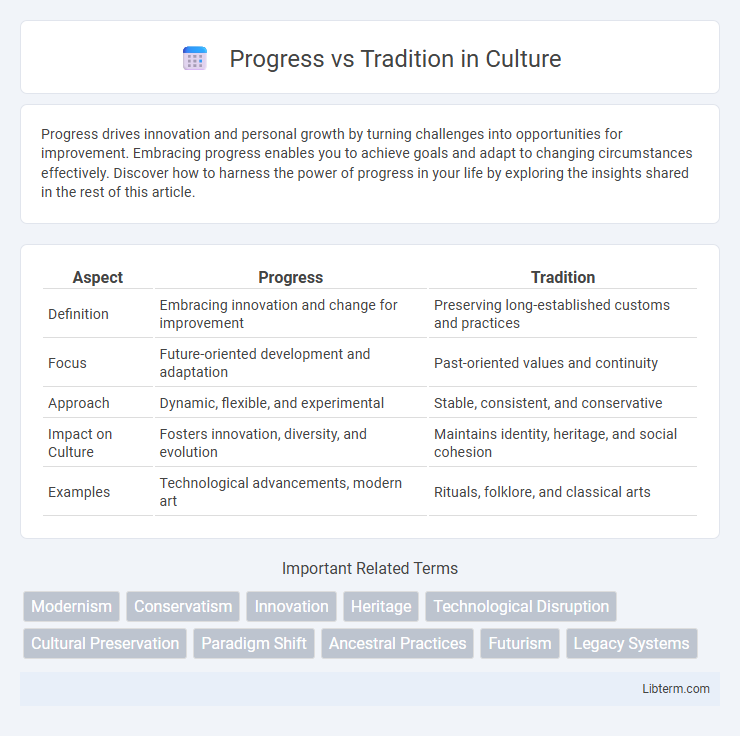Progress drives innovation and personal growth by turning challenges into opportunities for improvement. Embracing progress enables you to achieve goals and adapt to changing circumstances effectively. Discover how to harness the power of progress in your life by exploring the insights shared in the rest of this article.
Table of Comparison
| Aspect | Progress | Tradition |
|---|---|---|
| Definition | Embracing innovation and change for improvement | Preserving long-established customs and practices |
| Focus | Future-oriented development and adaptation | Past-oriented values and continuity |
| Approach | Dynamic, flexible, and experimental | Stable, consistent, and conservative |
| Impact on Culture | Fosters innovation, diversity, and evolution | Maintains identity, heritage, and social cohesion |
| Examples | Technological advancements, modern art | Rituals, folklore, and classical arts |
Understanding Progress and Tradition
Understanding progress involves recognizing the continuous evolution of ideas, technology, and social norms that drive innovation and improvement. Tradition represents the accumulated wisdom, cultural values, and established practices passed down through generations, providing stability and identity. Balancing progress and tradition requires respecting historical foundations while embracing change to foster sustainable development and cultural enrichment.
Historical Context: Roots of Tradition
Traditions often stem from deeply ingrained cultural, religious, and social practices that have evolved over centuries, providing a sense of identity and continuity within communities. Historical contexts like feudal systems, colonial legacies, and ancient rituals have shaped these traditions, embedding them into collective memory and societal norms. Understanding these roots highlights why tradition persists despite the pressures of modernization and rapid technological progress.
The Drive for Innovation: Defining Progress
The drive for innovation fuels progress by challenging traditional norms and fostering new technologies that transform industries and societies. Emphasizing research and development accelerates solutions that improve quality of life while redefining economic and cultural paradigms. This pursuit balances preserving valuable customs with embracing advancements that shape the future.
The Benefits of Embracing Tradition
Embracing tradition preserves cultural identity and fosters a strong sense of community, anchoring individuals in shared values and history. Traditional practices often offer time-tested solutions that promote sustainability and resilience in modern society. Maintaining tradition enhances intergenerational connections, ensuring that valuable knowledge and customs are passed down and enriched over time.
Challenges Posed by Rapid Progress
Rapid progress challenges traditional systems by disrupting established social norms and values, often causing cultural clashes and identity crises. Technological advancements accelerate change, outpacing regulatory frameworks and creating gaps in legal and ethical oversight. These tensions require adaptive strategies to balance innovation with preserving heritage and ensuring social cohesion.
Where Tradition Meets Modernity
Where tradition meets modernity, cultural heritage seamlessly integrates with cutting-edge innovations to create a balanced future. Time-honored practices are revitalized through advanced technology, ensuring their relevance in contemporary society. This fusion fosters sustainable development while preserving historical identity.
Societal Impacts: Progress vs Tradition
Societal impacts of progress often include increased innovation, economic growth, and improved quality of life, driven by advancements in technology, education, and healthcare. Tradition preserves cultural identity, social cohesion, and ethical frameworks that provide stability and continuity across generations. Balancing progress and tradition requires navigating the tensions between modernization's rapid change and the preservation of inherited values foundational to community well-being.
Cultural Identity in Changing Times
Cultural identity faces challenges as societies navigate progress and tradition, requiring a delicate balance to preserve heritage while embracing innovation. Rapid technological advancements and globalization reshape social norms, influencing language, customs, and values integral to community cohesion. Maintaining cultural continuity amid change fosters resilience and enriches diverse identities crucial for sustainable development.
Balancing Heritage and Advancement
Balancing heritage and advancement requires integrating time-honored cultural values with innovative technologies to foster sustainable growth. Preserving traditional practices enhances community identity while adopting modern solutions drives economic development and improved quality of life. Emphasizing adaptive strategies ensures that progress honors historical roots without stifling creativity or innovation.
The Future: Harmonizing Progress and Tradition
The future hinges on harmonizing progress and tradition by integrating innovative technologies with cultural heritage to foster sustainable development. Embracing digital transformation while preserving traditional values ensures resilient communities and enduring social cohesion. Strategic policies that balance modernization with respect for historical practices cultivate a future where advancement and heritage coexist symbiotically.
Progress Infographic

 libterm.com
libterm.com